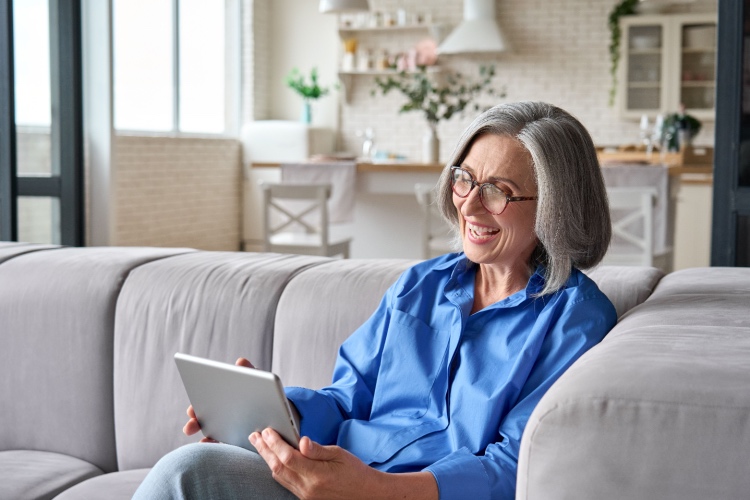
Telehealth has transformed how older adults access care, making counseling more convenient and less intimidating. For many seniors, being able to connect with a counselor from the comfort of home reduces travel stress, saves time, and provides access even when mobility is limited. But while telehealth offers many benefits, there are times when it isn’t the best choice. In some cases, in-person sessions or a higher level of care would be more beneficial.
Table of Contents
- Why Telehealth Matters for Seniors
- The Benefits of Telehealth Counseling
- When Telehealth Works Well
- When Telehealth May Not Be Enough
- Examples of Situations Requiring In-Person Care
- Balancing Telehealth and In-Person Counseling
- How Seniors and Families Can Decide
- Why Thoughtful Care Choices Matter
- Finding the Right Support with Blue Moon Senior Counseling
- FAQ
Why Telehealth Matters for Seniors
Older adults face unique challenges when it comes to accessing mental health care. Many no longer drive, rely on others for transportation, or live with chronic health issues that make leaving the house difficult. These barriers often mean counseling is delayed or avoided altogether.
Telehealth removes some of these barriers by making it possible to attend sessions virtually. For seniors living in rural or suburban areas with limited access to specialized providers, video sessions expand opportunities for care. For those with mobility limitations, telehealth provides a way to stay connected without the physical strain of traveling.
This growing accessibility has made mental health care more approachable for many seniors. However, it is not suitable for every situation, and knowing when to consider in-person options is equally important.
The Benefits of Telehealth Counseling
Accessibility and Convenience
Telehealth eliminates many of the practical difficulties of attending counseling sessions. There is no need to arrange transportation, deal with heavy traffic, or worry about getting in and out of buildings. Seniors with health conditions or limited energy can attend appointments without exhausting themselves.
The convenience of telehealth also supports consistency. It is often easier to keep appointments when they can be done from home. This regularity helps build progress in counseling, which is harder to achieve when sessions are frequently missed due to travel challenges.
Familiar Environments Reduce Anxiety
Opening up about difficult emotions can be stressful. For many older adults, being in their own home during counseling creates a sense of security. Familiar surroundings may encourage more honest conversations and help reduce the intimidation that sometimes comes with a clinical setting.
In addition, seniors who struggle with anxiety or social stressors often find that a home environment makes it easier to participate fully. Having access to personal items, pets, or a comfortable setting can help create a more relaxed atmosphere for counseling.
Bridging Geographic Gaps
Not every community has mental health professionals who specialize in working with seniors. This can leave older adults without access to providers who understand age-related concerns such as grief, chronic illness, or caregiver stress. Telehealth allows seniors to connect with qualified professionals regardless of location.
This ability to bridge distance is especially valuable for those in rural communities, where access to specialized care may be limited.
When Telehealth Works Well
Mild to Moderate Mental Health Concerns
Telehealth is often effective for older adults experiencing manageable symptoms of depression, anxiety, stress, or loneliness. These concerns can be addressed through counseling strategies, coping tools, and supportive conversations delivered virtually.
For seniors facing life transitions, such as retirement, the loss of a spouse, or reduced independence, telehealth offers a practical way to talk through challenges without the added stress of travel.
Ongoing Support and Maintenance
Seniors who have already developed coping strategies in counseling can continue their progress through telehealth. Regular check-ins provide accountability and reinforcement, helping prevent setbacks.
This model is particularly effective for maintaining mental health stability over time. Even if an older adult does not need intensive sessions, continued access to a counselor can help them stay grounded and supported.
Caregiver Support
Counseling through telehealth is not limited to seniors alone. Caregivers often experience burnout, stress, and feelings of isolation. Virtual sessions provide them with a private space to discuss challenges and find healthy ways to cope without leaving the person they care for unattended.
Supporting caregivers through telehealth not only benefits them but can also improve the overall caregiving environment.
When Telehealth May Not Be Enough
While telehealth can be a valuable tool, it has clear limitations. Certain situations require more direct, in-person support to ensure safety and provide effective care.
Safety Concerns in the Home
If an older adult lives in an environment where safety is at risk, telehealth is not the best choice. Situations involving controlling or abusive relationships make it difficult for seniors to speak openly during virtual sessions. Counselors may not be able to intervene effectively if the home itself is unsafe.
Crisis Situations
Telehealth is not designed for emergencies. If an older adult is experiencing suicidal thoughts, severe confusion, or behavior that could result in harm, in-person or emergency intervention is necessary. Virtual sessions cannot always provide the immediate support that urgent crises demand.
Severe Mental Health Symptoms
For seniors experiencing hallucinations, delusions, or extreme mood swings, telehealth does not provide enough structure or oversight. In-person counseling allows for more accurate assessments and closer collaboration with medical providers, which is essential in these cases.
When Privacy Isn’t Possible
Privacy is an essential part of counseling. If a senior cannot find a safe, private space at home, they may be unable to share openly during a telehealth session. In these situations, in-person counseling provides a secure environment where sensitive conversations can happen without interruption.
Cognitive Decline and Technology Barriers
Older adults with dementia or significant cognitive decline may struggle to engage through telehealth. Issues with technology, such as unreliable internet, difficulty using devices, or confusion about video platforms, can interrupt or prevent sessions. In-person care is often more effective when technology becomes a barrier.
Examples of Situations Requiring In-Person Care
Domestic Conflict or Abuse
If an older adult is living in an environment with conflict, threats, or abuse, in-person counseling is safer and more effective. Telehealth cannot provide protection if the person at risk cannot speak freely.
Firearms in the Home
The presence of firearms increases risk when there are signs of suicidal thinking or aggressive behavior. In-person counseling allows for more thorough safety planning and risk assessment than can be achieved virtually.
Medical Complexity
Many seniors live with multiple health conditions that overlap with mental health. Depression, for example, may be complicated by side effects of medication or the progression of a chronic illness. In-person counseling makes it easier to coordinate with medical providers and address these complex interactions.
Balancing Telehealth and In-Person Counseling
Telehealth and in-person counseling do not have to be seen as opposing choices. A blended approach often works best. For example, telehealth may be used for ongoing support, while in-person care becomes essential when symptoms intensify or safety concerns arise.
This flexibility allows seniors to benefit from the convenience of telehealth while still having access to the depth of in-person support when needed.
How Seniors and Families Can Decide
Choosing between telehealth and in-person counseling requires careful consideration of several factors:
- Severity of symptoms: Mild concerns may be well-supported virtually, while serious symptoms require in-person evaluation.
- Home environment: A secure and private space is necessary for telehealth to be effective.
- Comfort with technology: If using video platforms creates stress or confusion, in-person sessions may be better.
- Medical considerations: Seniors with overlapping physical and mental health concerns may need care that involves closer coordination with medical providers.
The best choice is the one that ensures safety, privacy, and effectiveness for the individual senior.
Why Thoughtful Care Choices Matter
Mental health support for older adults should always be based on what creates the safest and most effective outcomes. Telehealth expands access and reduces barriers, but in-person care is sometimes essential for addressing complex or high-risk situations. Recognizing when each option is appropriate helps protect well-being and encourages progress in counseling.
Finding the Right Support with Blue Moon Senior Counseling
Deciding between telehealth and in-person care is not always simple, but the first step is knowing that support is available. Whether the concern is anxiety, depression, grief, or the challenges of aging, counseling can make a difference.
Blue Moon Senior Counseling is ready to help seniors and families take that next step. Reach out to our team today.
FAQs
- Is telehealth appropriate for all seniors?
No. While many benefit from telehealth, it is not effective or safe in situations involving severe symptoms, crisis, or unsafe living conditions.
- What if an older adult struggles with technology?
If technology creates barriers, in-person sessions may provide a more reliable way to access counseling.
- Can telehealth support issues like grief or loneliness?
Yes. Virtual counseling can help seniors talk through feelings of loss or isolation, provided privacy and safety are maintained.
- How are emergencies handled in telehealth?
Counselors follow safety protocols, but in urgent cases, in-person or emergency services are required.
- How do families know if in-person care is needed?
In-person counseling is often necessary when symptoms are severe, safety is at risk, or privacy at home cannot be guaranteed.








